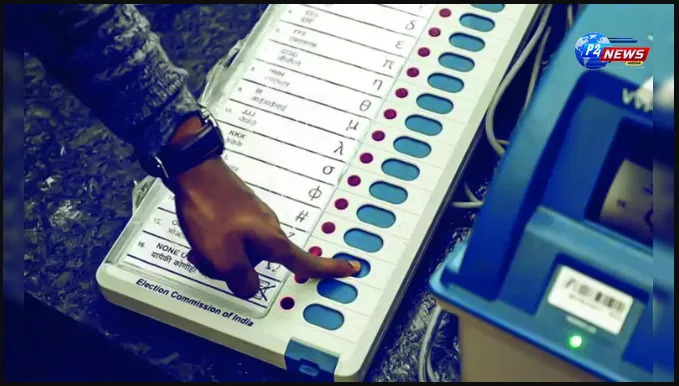The One Nation, One Election bill has ignited intense discussions, especially among Opposition leaders, regarding the practicality of conducting Lok Sabha and state Assembly elections simultaneously within the same year.
The One Nation, One Election bill has ignited intense discussions, especially among Opposition leaders, regarding the practicality of conducting Lok Sabha and state Assembly elections simultaneously within the same year.
Union Law and Justice Minister Arjun Ram Meghwal is poised to present The Constitution (One Hundred and Twenty-Ninth Amendment) Bill, 2024, in the Lok Sabha on the upcoming Monday. This significant piece of legislation seeks to synchronize the timelines for national and state elections, with an overarching aim of facilitating simultaneous voting for both the Lok Sabha and state Assemblies. The proposition has ignited considerable discourse, particularly among Opposition figures who assert that it may weaken the concept of federalism and present considerable practical challenges.
The 'One Nation, One Election' initiative is the cornerstone of this proposed legislation. It envisions a system where voters across India would cast their votes for national and state elections in the same year, although not necessarily on the exact same day. Currently, only a limited number of states—including Andhra Pradesh, Sikkim, and Odisha—conduct their state elections in parallel with national elections. In contrast, the majority of states follow distinct five-year electoral cycles, often leading to staggered elections that may contribute to voter fatigue.
Criticism from the Opposition has been vocal and varied, with several leaders raising serious concerns regarding the practicality and potential ramifications of the initiative. Senior Congress leader Digvijay Singh articulated skepticism regarding the viability of this proposal, particularly if a state government were to collapse mid-term. He stressed that citizens could find themselves without a functioning government for extended periods, questioning how the system could adapt if a state lost its majority shortly after the elections, given that elections cannot be delayed for more than six months.
Congress MP Jairam Ramesh has advocated for the bill to be sent to a Joint Parliamentary Committee for thorough examination, arguing that the initiative threatens to erode democratic principles. He referred to a letter from Congress President Mallikarjun Kharge written in 2023 that explicitly opposed the 'One Nation, One Election' concept.
In contrast, the ruling BJP-led NDA coalition has expressed support for the legislation, contending that it would result in significant savings of both time and resources, paving the way for unified elections across the nation. Prime Minister Narendra Modi has lauded the initiative, framing it as a pivotal move to bolster India's democratic framework and streamline the electoral process.
The proposal gained traction following the Union Cabinet's approval in September 2024, subsequent to an extensive consultation phase led by a high-level committee chaired by former President Ram Nath Kovind. This committee engaged in 191 days of dialogue with various stakeholders, experts, and researchers. Their recommendations included the implementation of simultaneous elections for the Lok Sabha, state assemblies, and local bodies in phases, contingent on nationwide agreement. The committee's findings were subsequently presented to President Droupadi Murmu.
The committee featured prominent figures such as Home Minister Amit Shah, Ghulam Nabi Azad, NK Singh, Dr. Subhash C. Kashyap, and Harish Salve, among others, with Arjun Ram Meghwal participating as a special invitee.
For the realization of the 'One Nation, One Election' vision, the government has proposed three legislative measures, two of which are constitutional amendment bills. The first constitutional amendment bill permits joint elections for the Lok Sabha and state assemblies. It proposes modifications to Article 82A, establishing provisions for an 'appointed date' for simultaneous elections, ensuring that the tenures of the Lok Sabha and state assemblies conclude on the same date.
The second constitutional amendment bill requires the consent of at least half of the state assemblies, aiming to modify provisions concerning electoral rolls to guarantee coordination between the Election Commission and state election commissions for local body elections.
The third legislative measure seeks to align the terms of Union territories with legislative assemblies, such as Puducherry, Delhi, and Jammu and Kashmir, ensuring consistency with the Lok Sabha and state assembly tenures. This bill proposes amendments to various acts, including the Government of National Capital Territory of Delhi Act (1991) and the Jammu and Kashmir Reorganisation Act (2019).
The anticipated introduction of the bill in the Lok Sabha on December 16 is likely to provoke additional discussions and debates surrounding this controversial initiative.
Like
Dislike
Love
Angry
Sad
Funny
Pray
'Trump Tracker: Tulsi Gabbard's Surprising Appointment as US Intelligence Chief
November 14, 20249th Ayurveda Day in Melbourne: A Celebration of Ayurvedic Innovations and Global Health Impact
November 10, 2024🍪 We Value Your Privacy and Experience Hi there! We use cookies to enhance your browsing experience, provide personalized content, and analyze site traffic. By continuing to use our site, you consent to our use of cookies.







Comments 0